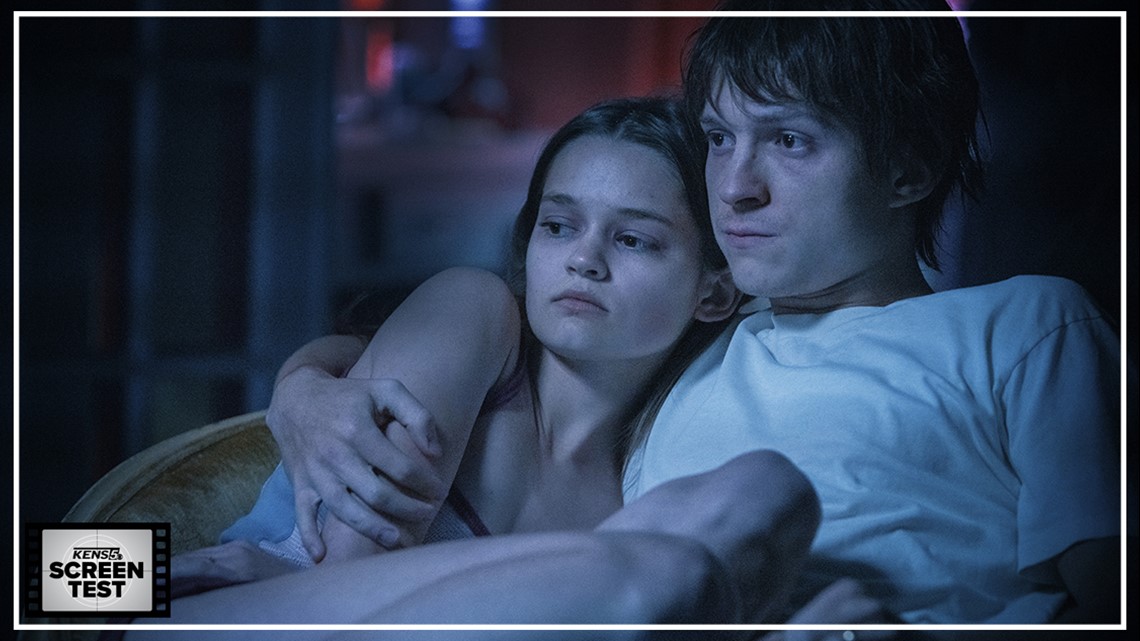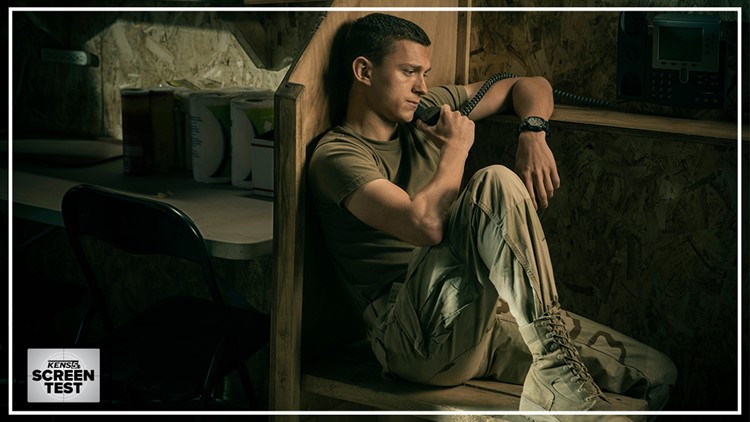There are no heroes to be found, let alone superheroes, in Joe and Anthony Russo’s “Cherry,” the brothers’ first time in the director’s chair since etching their names into movie history with the box office-busting “Avengers: Endgame.” There’s nothing that will inspire you, nor is there any act of vibranium-plated altruism seeking your applause. The atmosphere is seedy, the mood cynical, the worldview despondent enough to dissuade Thanos.
And the Russos are reveling in it.
Turning to the dark side (literally and figuratively) of big-screen storytelling, the brothers’ encore to their Marvel Cinematic Universe victory lap constructs a domino chain of American crises – socioeconomic plight, military PTSD, opioid addiction, Hollywood’s tendency to overexaggerate to the point viewers are rendered numb – before the Russos gleefully swim around the various pieces, unburdened and ultimately undone by the air-tight calculations of Kevin Feige’s superhero enterprise (and perhaps providing clarity as to who the success of the Infinity Saga’s finale ultimately resides with). “Cherry” is another saga of loss and eventual maybe-resurrection, but this one doesn’t have the advantage of fantasy to shield itself from an imprecise, largely inept approach to ongoing real-world issues.
Instead, the Russos find another way to overwhelm, creating what ultimately amounts to a feature-length excuse to indulge in everything that’s forbidden within the MCU’s family-friendly confines—F-bombs, gore, irredeemability. It’s hardly noble – the Russos would probably argue they aren’t trying to be – but it’s also hardly worthy of the subject matter’s contexts, no matter how well the frenzied filmmaking and melodramatic messiness is meant to function as a mirror of their protagonist’s tumultuous state.
The Russos bring Spider-Man 3.0 himself along for the 1.0 ride into R-rated territory, casting Tom Holland as a nameless protagonist (although he’s credited as “Cherry,” so we’ll roll with that) for a story that opens with Cherry robbing a bank in 2007, a look of wildness in his eyes. Here we get a taste of the movie’s stylistic antics as Holland breaks fourths walls left and right, settling us into the self-defeating tenor of dialogue that’s one of many methods the film employs to dubiously cover up how hollow it rings (“Something is always drawing me away until there’s nothing holding it together.”).
The movie then rewinds five years, to a younger-looking Cherry sporting adolescent bangs and Peter Parker glasses in a college classroom. Written by Angela Russo-Otstot and Jessica Goldberg (and adapted from Nico Walker’s 2018 novel), the screenplay deftly establishes where Cherry will end up and where he will come from. But dipping into the narrative’s chronological past shows the character has always been one for living with little regard for what awaits beyond the next five minutes; the same can be said for the film. In due course, “Cherry” sets off on a formulaic plot about newly ignited romance and its rocky beginnings before the fangs of addiction clamp down on it down the line. At the same time, we observe the Russos magnifying the particulars of the plot when it suits them – an eye-rolling development sees Cherry spontaneously joining the Army during a brief interlude in love with Emily (Ciara Bravo, not entirely convincing here), only for her to return promptly after – and zooming back out when it doesn’t—there’s virtually no establishing Cherry as a unique character with his own aspirations aside from popping ecstasy and keeping rowdy company.
The directors show flashes of visual style in this first act – the color drains from the screen when Cherry gets high, the camera swivels around the interior of a car in a heated moment – but the showboatiness goes from embellishment to foundation as the story progresses into Cherry’s stint at boot camp, where drill sergeants so berate their inferiors that their insults spit onto the screen in bright, cherry-red blocks of text. It doesn’t do much besides increase the dosage of self-awareness being lobbed the audience’s way, and “Cherry” wears its overwrought attitude like a badge of pride. But self-awareness can only go so far when the film’s sentiments are cheapened by aesthetic hyperbole.
Thus, like the wrong kind of clockwork, we have no clue how to react when things take a dark turn during Cherry’s subsequent overseas deployment. Horrific scenes serve to telegraph this story’s grimmest segments amid thinly outlined indictments of American militarism, but “Cherry” has done so little to win our investment in Holland’s character, despite the young actor doing his damndest to show he’s capable of more dimensions than just perky Peter Parker (Holland reaches deeper here than in last year’s “The Devil All The Time,” though that isn’t really saying much).


In “Cherry’s” war-set chapter, as in later ones, there’s a particular feeling the Russos are reaching for anything and everything for momentum; individual scenes tend to blur the movie’s thematic through-lines, presenting plenty to interrogate without fully interrogating them and hoping that the depiction of cliches is enough to be seen by the audience as subversion. Instead – despite some assured camerawork and a few attentive shots – the movie gets up to its neck in superficiality. One of the strangest moments arrives when “Cherry” abruptly cuts from the darkest pits of Cherry’s lonely deployment to the bright lights of his inevitable return stateside…
...although if we momentarily believe the film has sidestepped gritted-teeth despair, its final hour wades fully into it. Here, a movie that has already skipped through the genres of adolescent romance and war tale plants its feet in addiction drama, occasionally leaning into crime thriller. Noticeably absent, however, are thrills as Cherry robs local banks to keep up with his debts, but Holland and Bravo do manage to wring some drama out of their descent into opioid reliance. Their dynamic of sweat-streaked physiques and abandoned self-care takes on an air of tragedy as the lovers become equally resigned to torturing themselves together. Still, “Cherry” is far too keen on drawing out their spiral that it neglects to depict the initial stumble into the heart of American darkness; before we know it, their cozy, sun-drenched home has become a cavern of empty pill bottles and furious shouting matches. The film’s depictions of addiction are inarguably visceral – I found myself flinching more than once, amid raising my eyebrow at the excess – but there continues to be a void at its emotional core as “Cherry” veers in and out of seriocomedy, a mirage of tonal clashes the Russos don’t have the chops to turn into something entertaining or meaningful.
On the one hand, the Russos set a high bar for themselves—college-aged romance can trip into triteness, and Hollywood sports a low batting average in its attempts to portray America’s Middle Eastern conflicts and opioid crisis reckoning in a substantive way. Yet the reason their film struggles to hit any of its marks begins with their primary motivations, ones that seem to be less about effective storytelling and more about crashing the late-night party of capital-M Meaningful Cinema occupied by filmmakers who have steadily built up to the material. With “Cherry,” the Russos’ arrival to that side of moviemaking is loud, clumsy and apt to be forgotten quicker than a population-decimating snap.
"Cherry" is rated R for graphic drug abuse, disturbing and violent images, pervasive language, and sexual content. It's streaming on Apple TV+ Friday, and will screen in some San Antonio theaters beginning March 12.
Starring: Tom Holland, Ciara Bravo, Jack Reynor, Forrest Goodluck
Directed by Joe and Anthony Russo
2021
MORE REVIEWS:
- ‘Nomadland’ Review: Frances McDormand ventures west in a lament and tender celebration of America’s final frontiers
- ‘I Care a Lot’ Review: Rosamund Pike creates a startup out of con artistry in mishandled thriller
- ‘Judas and the Black Messiah’ Review: True-life treachery within the Black Panthers’ ranks
- ‘Land’ Review: Robin Wright the director lets down Robin Wright the actor
- ‘Sator’ Review: Something’s in the woods, and in the mind
- 'At the Ready' director Maisie Crow on telling her subjects' stories through their own eyes
- 'We were learning the whole time': 'Cusp' co-directors on capturing the aimlessness of being a teenage girl in small-town Texas
- The best movies we watched at the 2021 Sundance Film Festival



